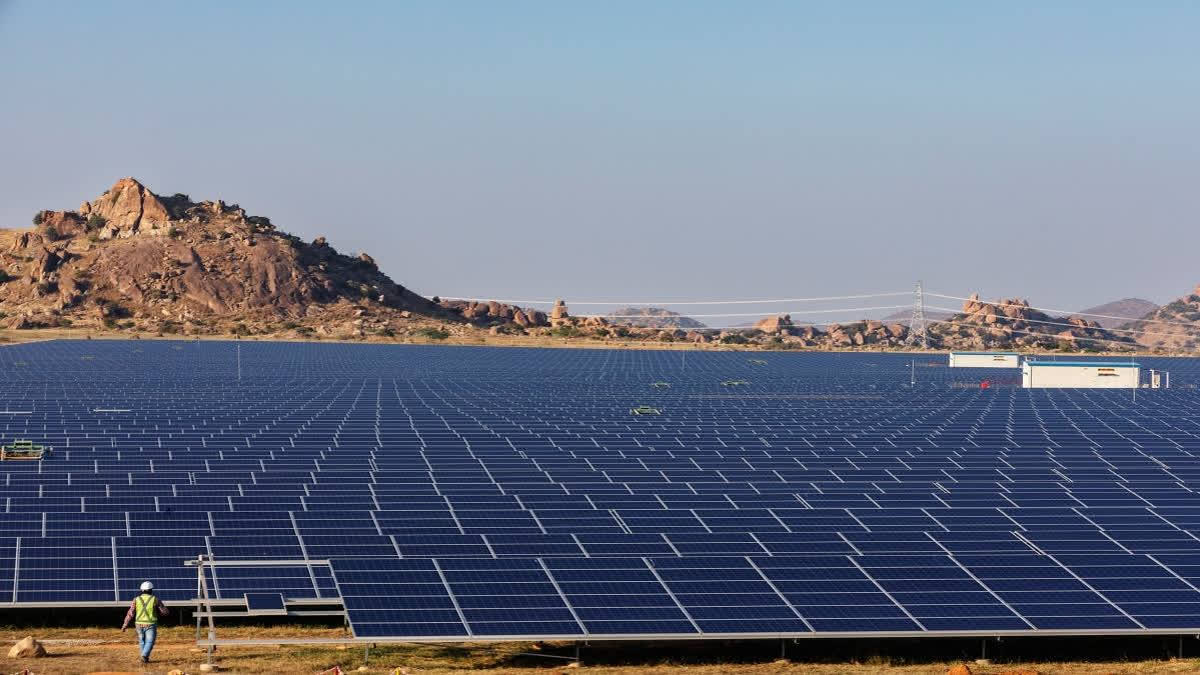New Delhi: As the world grapples with the escalating threat of climate change, solar energy is taking centre stage in a global shift toward sustainable power with nations investing heavily in solar infrastructure, according to a series of reports released on Tuesday.
The third edition of the World Solar Report series was released during the Seventh Assembly of the International Solar Alliance (ISA) here. The series comprises four reports focusing on global solar growth, investment trends, technological advancements, and Africa’s green hydrogen potential.
First released in 2022, the World Solar Report series provides valuable insights into trends, technologies, and policies shaping the solar energy sector. The reports serve as a key resource for policymakers, industry professionals, investors, researchers, and environmental advocates interested in understanding the role and growth of solar power as a vital element in the renewable energy transition. This year’s edition was released by the President of the ISA Assembly and Union Minister for New and Renewable Energy Pralhad Joshi.
“As the President of the International Solar Alliance, I would like to acknowledge that today the world stands united like never before, combining the global efforts towards the energy transition,” Joshi said while addressing Tuesday’s event. “The significance of advancing solar technology cannot be overstated as we move towards the clean energy transition. With the challenges posed by climate change, our collective efforts to innovate and implement this sustainable solution are more important than ever.”
Of the four reports of the series released, the ones on global solar growth, investment trends and technological advancements deserve particular attention.
Growth in the world solar energy market
According to the World Solar Market Report in the latest edition of the series, there has been exceptional growth in the solar energy sector with global capacity soaring from 1.22 GW in 2000 to 1,418.97 GW in 2023.
“In just two decades, global solar capacity has exploded from 1.22 GW in 2000 to an astounding 1,418.97 GW in 2023 - a staggering 40 per cent annual growth rate,” the report states. “In 2023 alone, 345.83 GW of solar power was added, accounting for three-quarters of all new renewable capacity worldwide. Solar generation has surged similarly, rocketing from 1.03 TWh (terawatt hours) in 2000 to 1,628.27 TWh in 2023.”
The report further states that, by the close of 2024, the capacity for global solar manufacturing is projected to exceed 1,100 GW, which is more than twice the anticipated demand for PV panels. In what is indicative of a trend towards greater affordability in solar technology, solar cell prices have reached $0.037 per watt.
In terms of employment, the clean energy industry has created 16.2 million jobs, with solar leading the charge at 7.1 million. This is an increase of 44 per cent from 2022’s 4.9 million.
“Global solar capacity is set to skyrocket to between 5457 and 7203 GW by 2030, driven by Paris Agreement commitments,” the report states. “This surge underscores the massive infrastructure push needed to meet climate goals.”
A major shift in global energy investments
According to the World Investment Report of the series, global energy investments are set to soar from $2.4 trillion in 2018 to a projected $3.1 trillion in 2024, an annual rise of nearly 5 per cent. In what is a sign of a shift towards renewable energy, global clean energy investment is now nearly double that of fossil fuels, and is set to shoot up from $1.2 trillion in 2018 to $2 trillion by 2024.
“Investments in solar represented around 59 per cent ($393 billion) of all renewable energy investments ($673 billion), driven largely by a drop in solar panel costs,” the report on investments states.
It further states that, region-wise, Asia-Pacific is by far the leader in solar energy investments pouring $223 billion in this sector in 2023. Europe, the Middle East and Africa accounted for $91 billion in 2023 followed by North, Central and South America with $78 billion in the same period.
Major breakthroughs in solar technology
The World Technology Report of the series highlights the rapid progress being made in the field of solar technology. These innovations are not only enhancing the efficiency and accessibility of solar power but are also paving the way for a more resilient and cost-effective power infrastructure.
“Solar PV monocrystalline modules have hit a new high with record-breaking 24.9 per cent efficiency - a major leap in maximising solar energy potential,” the report on technology states. “Multi-junction perovskite cells are set to disrupt the solar panel industry, promising higher efficiency, lower production costs, and seamless integration with diverse surfaces - leaving traditional silicon panels in the dust.”
The report further highlights that solar manufacturing now uses 88 per cent less silicon per watt peak (Wp) than in 2004.
“The manufacturing process has undergone significant improvements, resulting in a drastic reduction in silicon usage - from consuming 16 gm/Wp in 2004 to 2 gm/Wp in 2023,” it states. “This 88 per cent decrease in silicon consumption not only reflects the strides made in optimising material efficiency but also underscores the potential for further cost reductions and environmental benefits.”
The report also highlights that utility-scale PV costs are also hitting a new low. The global weighted average levelised cost of energy (LCOE) for utility-scale solar PV dropped by 90 per cent - from $0.460/kWh in 2010 to $0.044/kWh in 2023, according to the report on technology.
To sum up, what the reports suggest is that as the momentum toward solar energy accelerates, the vision of a low-carbon future is no longer just an aspiration – it is becoming a global reality. With mounting investments and groundbreaking advancements, solar power is now more accessible, efficient, and affordable than ever.



